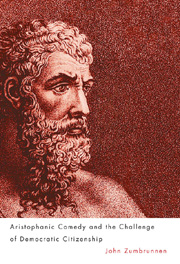Book contents
- Frontmatter
- Contents
- Acknowledgments
- Introduction
- 1 Peaceful Voyages: Peace and Lysistrata
- 2 Ordinary Citizens, High Culture, and the Salvation of the City: Clouds, Women at the Thesmophoria, and Frogs
- 3 Archē and the Anger of the Ordinary Citizen: Wasps and Birds
- 4 Elite Domination and the Clever Citizen: Acharnians and Knights
- 5 Fantasy, Irony, and Economic Justice: Assemblywomen and Wealth
- Conclusion: Democratic Possibilities
- Notes
- Bibliography
- Index
Conclusion: Democratic Possibilities
Published online by Cambridge University Press: 05 February 2013
- Frontmatter
- Contents
- Acknowledgments
- Introduction
- 1 Peaceful Voyages: Peace and Lysistrata
- 2 Ordinary Citizens, High Culture, and the Salvation of the City: Clouds, Women at the Thesmophoria, and Frogs
- 3 Archē and the Anger of the Ordinary Citizen: Wasps and Birds
- 4 Elite Domination and the Clever Citizen: Acharnians and Knights
- 5 Fantasy, Irony, and Economic Justice: Assemblywomen and Wealth
- Conclusion: Democratic Possibilities
- Notes
- Bibliography
- Index
Summary
Ultimately, this book seeks to advance three related claims. First, I mean to encourage a rethinking of democratic citizenship. Democracy, as I argued in the introduction, presents citizens with two fundamental demands that exist in tension with one another. In the context of contemporary debates between agonal and liberal or deliberative understandings of democracy, I have referred to these competing demands as democracy's rebellious impulse and democracy's impulse toward responsible and effective collective action. On one hand, democracy calls citizens to resist the institutionalization of rule. On the other hand, democracy calls citizens to participate in collective democratic action, which, if it is to be both effective and responsible, may well demand institutions. The tension between democracy's impulses or demands thus shapes the basic challenge of democratic citizenship.
Second, I argue that Aristophanic comedy suggests the need for a particular comic disposition among ordinary citizens if they are to meet the challenge of democratic citizenship. In Aristophanes's Athens, that challenge revolved around the interaction of a handful of elites with the mass of ordinary citizens. It was heightened by the suffering brought by the Peloponnesian War and its aftermath. In this context, Aristophanic comedy developed, deployed, and looked to instill in its audience a comic disposition manifested in comic voyaging, cleverness, and comic recognition. These three manifestations of the Aristophanic comic disposition are, at a conceptual level, complementary. All three point to a willingness to embrace and an ability to navigate the multiple meanings, the contingency, and the tension that mark the challenge of democratic citizenship. Together, they suggest what is required of ordinary citizens who must respond to democracy’s competing demands.
- Type
- Chapter
- Information
- Aristophanic Comedy and the Challenge of Democratic Citizenship , pp. 123 - 136Publisher: Boydell & BrewerPrint publication year: 2012



